No relationship with Huawei Technologies Co. Ltd. is cozier among the “Five Eyes” intelligence allies than Canada’s.
While Australia, New Zealand, the U.S. and the U.K. have executed efforts to block the Chinese telecom giant from becoming integrated into their 5G networks, Canada has embraced Huawei through partnerships with universities and domestic telecom providers.
So if Ottawa, facing pressure in the wake of Huawei CFO’s Meng Wanzhou December arrest, re-evaluates its relationship with the Chinese tech company could the country find itself falling behind in 5G deployment?
“Without commenting at all on Huawei specifically, whether one company or another company is more or less active is probably not going to be a significant driver of 5G adoption,” said Duncan Stewart, director of technology, media and telecommunications (TMT) research for Deloitte Canada.
His multinational professional services firm released its annual TMT forecast on December 11, predicting about 1 million 5G handsets will be sold globally in 2019.
The 1 million handsets pales in comparison to the projected 1.5 billion smartphones that will be sold next year, which is why Stewart described 2019 as a “starter year” for 5G deployment ahead of wider deployment in 2020.
The TMT report notes there were 72 operators testing 5G in 2018, with 25 expected to launch 5G services in part of their territories by the following year.
Another 26 operators are expected to launch 5G services in 2020.
“There are a number of players out there that will be playing in the 5G ecosystem,” Stewart said.
“There are enough different players that it’s going to happen, they’re all going to be standards compliant and it will roll out around the world.”
But this 5G rollout is coming as concerns from politicians and intelligence officials ratchet up over Huawei’s ties to Beijing.
American intelligence officials told members of the U.S. Senate in February that they would advise consumers against buying the devices due to spying concerns.
The Pentagon subsequently banned the sale of both Huawei and China’s ZTE Corp. phones from retail stores on military bases.
Japan banned Huawei and ZTE from network hardware procurement earlier this month.
While not referring specifically to Huawei, U.S. Federal Communications Commission chairman Ajit Pai issued a warning in March about national security threats posed by “certain communications equipment providers.”
“Hidden ‘back doors’ to our networks in routers, switches – and virtually any other type of telecommunications equipment – can provide an avenue for hostile governments to inject viruses, launch denial-of-service attacks, steal data, and more,” he said in a statement.
Meanwhile, the University of British Columbia received $3 million from Huawei in October 2017 for research and development and communications research.
UBC said Huawei would invest over $10 million in Canadian universities’ research in 2017.
Last year, Simon Fraser University said it was adding an advanced research computing system with Huawei as the supplier.
And Vancouver-based Telus Corp. has been partnering with Huawei on its “5G Living Lab” while tapping the Chinese telecom giant as one of its largest suppliers.
Scott Bradley, vice-president of corporate affairs at Huawei’s Canadian office, told BIV in May that his company has operated in Canada for a decade without any issues.
“We were open and transparent with the Canadian government. We were open and transparent with our operators,” he said.
“You can clearly look at the benefit of the approach that Canada has taken with respect to 5G, with respect to competition. We operate within that framework.”
—With files from Jeremy Hainsworth, Glacier Media




